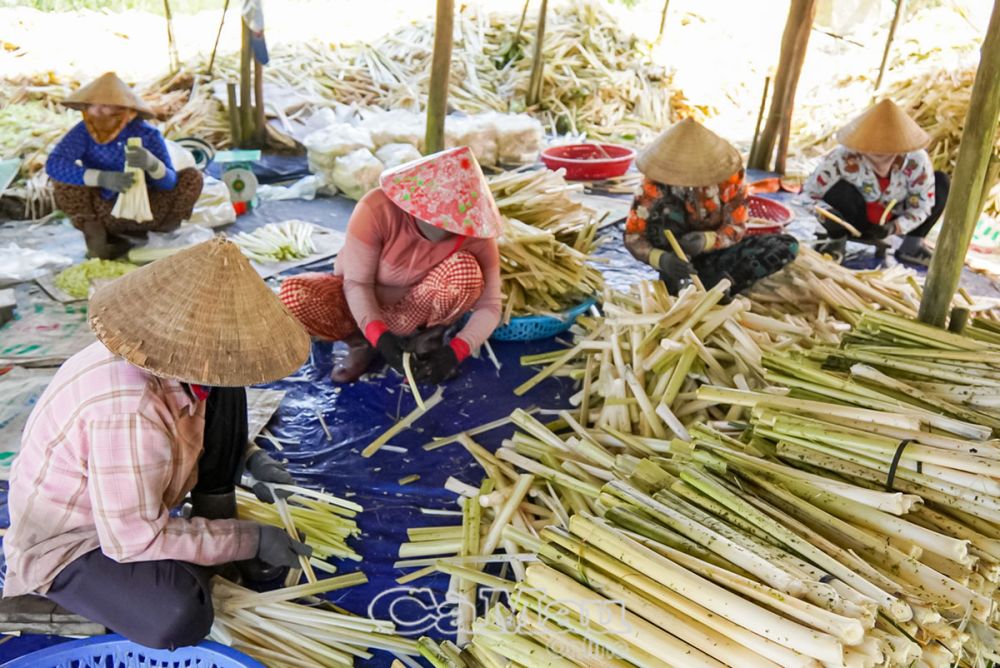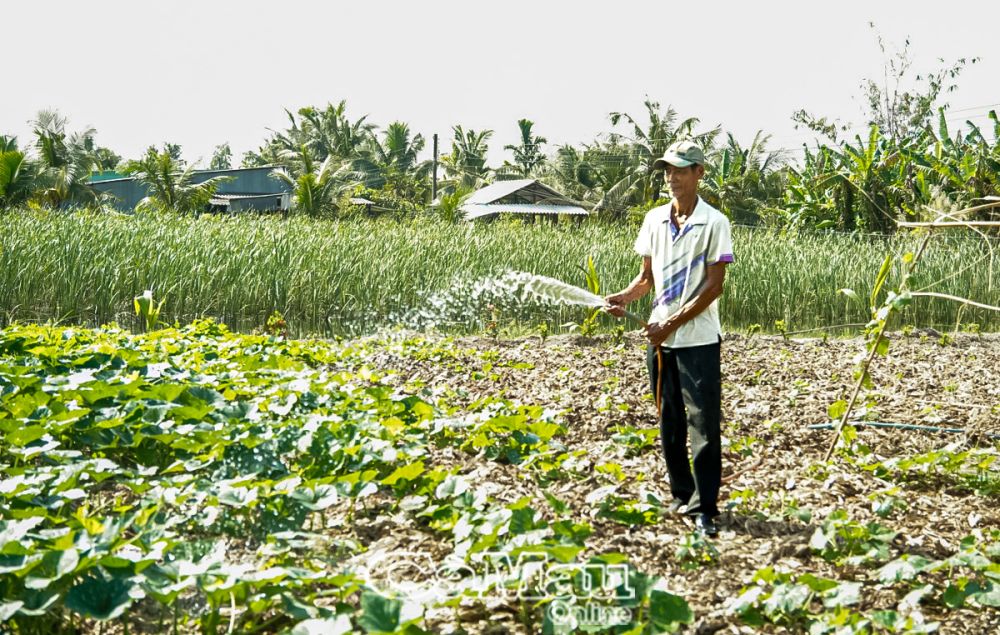 Over the past year, all levels, sectors, and localities in the province have been resolute in the work of eliminating temporary and dilapidated houses, alongside effective poverty reduction efforts, so that people not only have stable housing but also long-term security.
Over the past year, all levels, sectors, and localities in the province have been resolute in the work of eliminating temporary and dilapidated houses, alongside effective poverty reduction efforts, so that people not only have stable housing but also long-term security.
Districts and communes have been making efforts to eliminate temporary and dilapidated houses , relying not only on state resources but also on social mobilization.
For example, in Khanh An commune, U Minh district, in 2024, the commune mobilized social funding to build 31 houses for poor, near-poor, and disadvantaged households in the hamlets, with a total amount exceeding 1.5 billion VND; implemented the construction of 1 new house and the repair of 8 houses under the program to eliminate temporary and dilapidated houses, with a total amount of 300 million VND. In addition, they mobilized 5 wheelchairs for social welfare beneficiaries, worth 10 million VND.
Mr. Le Tan Nhanh, residing in Hamlet 14, Khanh An Commune, has been classified as a poor household since 2022. He decided to lift his household out of poverty in 2024 thanks to the wholehearted support from the Party Committee and People's Committee of Khanh An Commune. He received 50 million VND in financial assistance for building a new house, sponsored by the Ca Mau Commercial Company. Mr. Nhanh shared: "This Tet holiday, I will have a spacious house to celebrate, so I am very happy. In addition, I also received additional capital to cultivate crops and raise livestock at home. I feel excited because I have a house and can earn a living. Even though I am older, having suitable business opportunities thanks to the assistance and guidance from the commune, I am confident in escaping poverty."

Besides eliminating temporary and dilapidated houses, Khanh An commune is also striving for sustainable poverty reduction, seeking solutions to eradicate poverty at its root. As a result, from 2023-2024, the commune reduced the number of poor households from 72 to 31, accounting for 0.6%, and the number of near-poor households from 34 to 29, accounting for 0.64%. The Party Committee and People's Committee of the commune aim to reduce both poor and near-poor households by 50% by 2025.
Mr. Ngo Thanh Phong, Chairman of the Commune People's Committee, said: “The commune will review and classify poor households. For example, for households with members of working age, the commune will contact local businesses to assist in finding local jobs, or help prepare employment documents to send to the Provincial Job Placement Center to be sent to businesses outside the province. If there are relatives in Ho Chi Minh City, we will contact them to ask them to find jobs in Binh Duong or Ho Chi Minh City to help the workers. For poor households with the ability to invest in livestock farming and production, the commune will support them with loans from the Social Policy Bank for small-scale livestock farming. For the elderly and infirm who are unable to work, there will be separate solutions such as working at home or engaging in small-scale wholesale.”

Khanh An commune in particular, and U Minh district in general, are achieving many positive results in poverty reduction. In 2024, U Minh reduced the poverty rate to 2.7% (from 1,238 poor households in 2023 to 723 households in 2024). The District People's Committee has implemented many solutions, including the National Target Program on sustainable poverty reduction, along with launching a program to eliminate temporary and dilapidated houses. According to Nguyen Thanh Liem, Vice Chairman of the District People's Committee: “We are implementing the program to eliminate temporary and dilapidated houses in two phases. Phase 1 will complete 75 houses in 2024, and the remaining houses must be completed by August 2025. Simultaneously, we are also implementing many solutions to help poor and near-poor households find employment and stable livelihoods through farming and livestock models, aiming for stable housing and a secure life. Because even with housing, if there is no employment to generate income , sustainable poverty eradication is impossible.”
Eliminating temporary and dilapidated housing is a major policy of the Party and the State. However, stable housing must go hand in hand with stable employment and a secure livelihood. As stated by Mr. Nguyen Quoc Thanh, Director of the Department of Labor, War Invalids and Social Affairs, at the nine-month review meeting on poverty reduction: “Eliminating temporary and dilapidated housing to provide people with stable living conditions is necessary, but knowing how to create ‘fishing rods’ for poor and near-poor households to engage in economic activities and find jobs right in their local area is even more important. Simply giving them decent housing is not enough to eradicate poverty. Having a house but not increasing average income cannot be called sustainable poverty eradication.”
Mr. Nguyen Quoc Thanh also shared his positive impression: "After inspecting many localities, I am pleased to see that many places have reported the situation accurately. Although many districts and communes still have many poor and near-poor households, and some have not even met the set targets, the poor and near-poor households that were reported to have been completely eradicated have very stable lives and good incomes, meaning they have genuinely eradicated poverty, not just achieved targets."
As of mid-December 2024, the province still has 4,400 temporary and dilapidated houses, of which 3,463 need to be rebuilt and 937 need to be repaired, with a total estimated cost of 236 billion VND. Of these, 1,322 houses belong to poor households and 1,566 to near-poor households. Comrade Nguyen Tien Hai, Secretary of the Provincial Party Committee and Chairman of the Provincial People's Council, affirmed that the elimination of temporary and dilapidated houses needs to be implemented according to the set plan, but also requires flexibility and specific solutions for poverty reduction and livelihood creation for households with houses. He also requested that localities review and implement the construction and repair of houses for eligible households, ensuring completion before the Lunar New Year of the Year of the Snake 2025.
Lam Khanh
Source: https://baocamau.vn/an-cu-song-hanh-sinh-ke-a36459.html




![[Photo] General Secretary To Lam working with the Central Inspection Committee](https://vphoto.vietnam.vn/thumb/1200x675/vietnam/resource/IMAGE/2026/03/05/1772718314670_a1-bnd-8682-5192-jpg.webp)
![[Photo] Prime Minister Pham Minh Chinh receives the Minister of Emergency Situations of the Russian Federation.](https://vphoto.vietnam.vn/thumb/1200x675/vietnam/resource/IMAGE/2026/03/05/1772712011395_ndo_br_thiet-ke-chua-co-ten-76-png.webp)


















![[Infographic] Action Program of Candidates for the 16th National Assembly - Constituency No. 4](https://vphoto.vietnam.vn/thumb/402x226/vietnam/resource/IMAGE/2025/9/26/1331532306fb4ad18e4a849e5c64202a)













































































Comment (0)